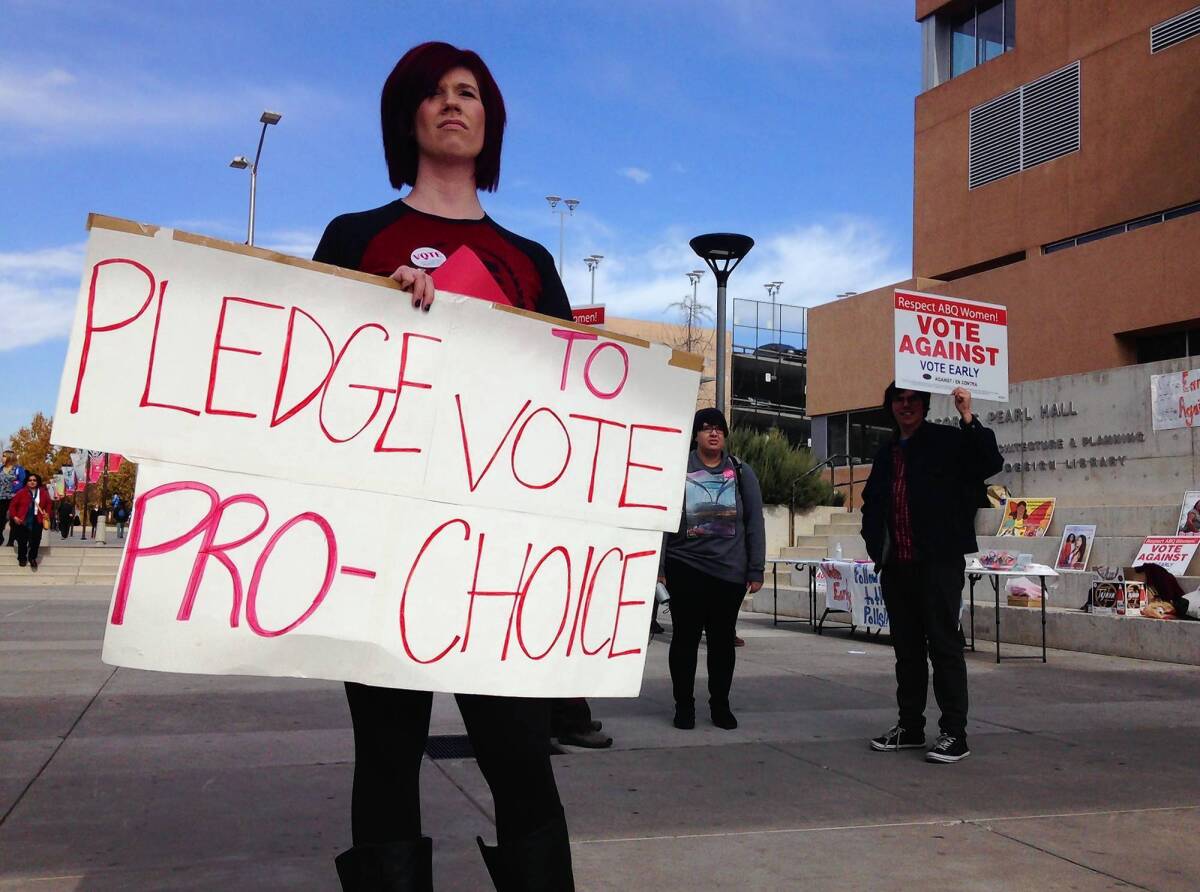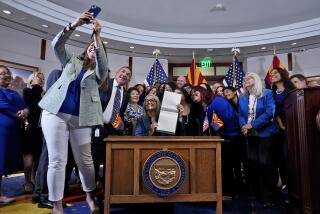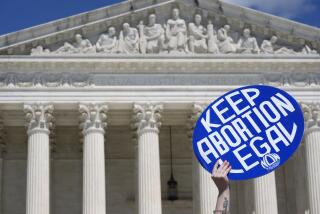Albuquerque becomes latest abortion battlefield

ALBUQUERQUE — A high-desert city in one of the poorest states in the nation has become the abortion debate’s latest battlefield and a testing ground for whether abortion limits can be imposed on the local level.
Early voting is underway in Albuquerque for an election Tuesday, which will decide whether to ban abortions after 20 weeks of pregnancy.
Although similar bans have been passed by state legislatures, New Mexico’s largest city is believed to be the first municipality in the country to place such an initiative on a ballot.
The “Pain Capable Unborn Child Protection Ordinance,” which needs a majority to pass, would have statewide impact because the only late-term abortion providers in the largely rural state are in Albuquerque.
Women living out of state also fly to Albuquerque for this type of care, said Micaela Cadena, policy director at Young Women United. The New Mexico-based group is part of the Respect ABQ Women campaign, which is fighting the local measure.
“Albuquerque voters are voting for the whole state of New Mexico and also for the rest of the country,” Cadena said.
The Supreme Court’s ruling in Roe vs. Wade has been interpreted by lower courts as making abortion legal through 24 weeks of pregnancy, but antiabortion activists are pushing to ban the procedure after 20 weeks — a step in chipping away at the 1973 landmark ruling.
Tara and Bud Shaver, who call themselves pro-life missionaries, moved to New Mexico three years ago from Kansas, a center of antiabortion activism, with the intent of mobilizing a campaign to shut down Southwestern Women’s Options — one of a handful of clinics in the country that provide late-term abortions.
There doesn’t seem to be a consensus on when a pregnancy is considered late-term, with definitions ranging from the 20th week of gestation to the 27th.
Tara Shaver said that although terminations after 20 weeks account for about 1.3% of all abortion procedures, banning them would be one step toward outlawing the practice entirely.
In Albuquerque, it’s hard to get away from any mention of the measure.
Campaign ads have taken over radio and television. Commuters drive down boulevards flanked with signs that read “Vote for Late Term Abortion Ban” or “Respect ABQ Women. Vote no Nov. 19.”
On a recent weekday morning at University of New Mexico, Shaver and her contingent of volunteers handed out leaflets to backpack-toting students hurrying to class.
At about the same time a “truth truck” — as the antiabortion group contingent calls it — maneuvered along a road cutting through campus. The truck carried its a billboard-sized picture of what looked to be a dismembered fetus.
“We’re going to show them the truth — what abortion really does,” Shaver said.
The night before, a group of abortion rights advocates gathered downtown. Bineshi Albert and her 17-year-old daughter, Dezbah Evans, munched on pizza before they took to the streets with their best pitch in opposition to the ban.
“As a Native American, I have some experience with the government telling us what to do with our land, our hair, our body, our language, our culture,” Albert said. “I can relate that experience to me as a woman, and I just don’t think the city government should have a say to regulate what happens to my body.”
To get the measure on the ballot, Operation Rescue and other antiabortion groups gathered 27,000 signatures — more than twice the number the city requires. If successful, the ordinance could be implemented days after city officials certify the election.
Councilman Dan Lewis, who describes himself as pro-life, said that if the measure passes and is challenged in court, the city will be obligated to defend it.
Councilwoman Trudy Jones, who has questioned the constitutionality of the measure, said abortion should not be a municipal issue. The special election will cost the city at least $500,000, and legal bills to defend it could triple that amount — a strain for a poor city, she said.
“We could feed a lot of babies for million and a half dollars,” she said.
Opponents of the measure, including state Atty. Gen. Gary King, have said they’re prepared to sue if the measure passes.
Dave Sidhu, a constitutional scholar at the University of New Mexico, pointed to recent court rulings throughout the nation that have struck down similar bans at the state level.
Just the next state over, Arizona officials have appealed to the U.S. Supreme Court after a 20-week limit on abortions was struck down by a federal court. Eleven other states have also adopted 20-week limits. Several of these bans have been blocked by courts while litigation is pending.
In addition to the advertising blitzes, the fight over the measure is playing out at front doors, in parking lots and on college campuses — anywhere proponents and opponents can make their pitch.
At the university, Shaver approached Rachel and Garrett Wolff and asked whether they had heard about the measure. Rachel Wolff, who is 18 weeks pregnant, said she had.
At first, it appeared Shaver had persuaded both to vote for the measure. But Rachel Wolff’s eyebrows rose when she discovered the initiative does not make exceptions for women who are victims of incest or rape.
The only exception is for women whose lives would be in danger if they were to carry the fetus to term. Wolff found that provision too limited.
Her husband agreed.
“I think they should make concessions for rape, incest and deformities,” he said.
At this point, he said, he’d likely just not vote.
About an hour later, opponents and supporters of the measure rallied outside the university’s bookstore.
Two women from Survivors of the Abortion Holocaust, a group based in Riverside, Calif., held a sign that read “Keep this legal” above a picture of what looked like a baby’s severed head.
A few passersby tried not to look. Others shook their heads. Some accepted the leaflets the women handed out.
At the other end of the plaza, other women tried to warn pedestrians about the Riverside protesters, carrying signs that read “Trigger warning: deceptive images ahead.” Other women shouted, “Our bodies, our choice.”
At one point the two groups converged and began a shouting match that had to be broken up by police.
times.com”>cindy.carcamo@latimes.com
More to Read
Sign up for Essential California
The most important California stories and recommendations in your inbox every morning.
You may occasionally receive promotional content from the Los Angeles Times.











